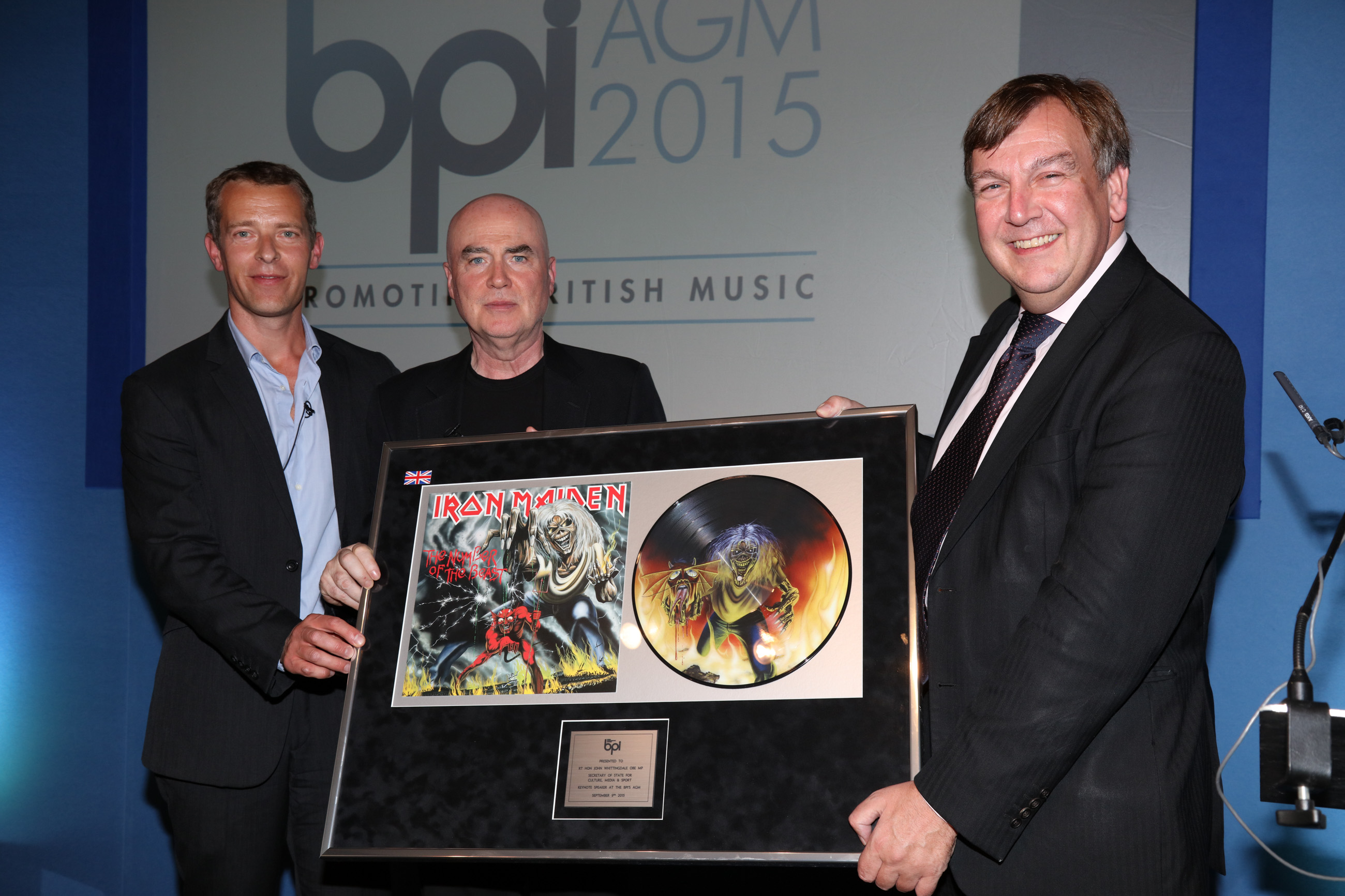Geoff Taylor has been a familiar figure in the UK music industry for more than 15 years.
As chief executive of the BPI, BRITs & Mercury Prize, he was often the voice of the British music industry, whether that was his two appearances during the DCMS Committee streaming inquiry, regular analysis of issues for the media (including numerous Music Week contributions) or behind the scenes in the corridors of power.
Taylor stepped down from that role at the beginning of 2023, and he’s marked the occasion with the Music Week Interview in the print edition of the magazine. It covers his favourite BRITs incident (not quite a meeting of minds between Robbie Williams and Lord Vaizey), his thoughts on the MPs during the streaming inquiry and even his own little known musical hinterland.
Of course, there’s plenty to talk about in terms of the evolution to streaming, which first involved a rigorous attempt to deal with the piracy that had sent the industry into decline in the noughties. Even with eight years of consecutive growth, the value of recorded music in the UK is still not back to its peak once inflation is factored into the calculation.
The outgoing BPI boss stressed that combating piracy was essential for creating the conditions for today’s licensed streaming economy.
“There’s been a huge amount of work on piracy,” he told Music Week. “We laid the foundations for the return to growth of the industry through streaming. Later on, we added the value gap issue, which was platforms not paying properly for music. We have been trying to fight for everyone to get their fair value [from music].”
In the Music Week Interview, Taylor identifies key areas for the industry to deal with in the months and years ahead, including the metaverse and Web3, data, artificial intelligence and the licensing of new platforms.
He also suggested that the time is right for the UK government to provide more backing to boost exports.
“I've just got back from South Korea, where the government invests £25 million a year in supporting local companies to grow internationally,” he said. “We should be at that kind of scale.”
Taylor credited the music business for embracing streaming despite the impact on physical music sales (notwithstanding an increase in vinyl sales for the last 15 years).
“I've always been a strong advocate that we have to lean into the future and embrace new business models where we can, and I think the industry really did do that,” said Taylor.
Here, in some extended highlights from the interview, Geoff Taylor shares insights on central issues including exporting talent, the international dominance of the UK music industry, the vinyl boom, the indie sector, TikTok, dealing with politicians and the outlook for streaming growth…
Championing indies at the BPI
“Within the BPI, the key dynamic for me was to try to increase the voice of the indies and strengthen the indie representation around the BPI table. When I look at our key indie labels now, you have labels like Dirty Hit, Marathon, Good Soldier, Partisan, all active members of the BPI. We have all the respected catalogue labels like Cherry Red and Demon but also frontline labels who are putting out chart music, and that's really important to me. So the indie community has really strengthened the BPI, and I've been very focused on doing things that help them compete and succeed. That's really where all the work to persuade the government to bring in the Music Export Growth Scheme was directed at and, similarly, bringing in the Mercury Prize [within the BPI]. They're both really important to the independent sector.”
Global competition
“Britain's record in developing global superstar artists is incredible, we can all be very proud of that. But I think the consensus is that that's getting harder, the barriers are getting higher. We face more international competition from the US, from Latin music. A lot of markets are becoming more heavily dominated by domestic repertoire. So it's a really challenging time, and I think government takes for granted the global success of British music. We need to persuade the government that now is the time to invest at a time when the global music market is expanding rapidly. There's a huge opportunity for growth in developing markets, but unless the UK steps up its game it’s going to lose market share. The time is right for government to be more ambitious in supporting British music. The MEGS scheme already generates a 13-times return on investment. But putting between half a million and million pounds a year into supporting British music globally is not ambitious enough, it should be many times that.”

Ownership of the UK music industry
“I always think that the emphasis on multinationals is a bit misguided because it is a fantastic thing that international companies want to invest in the UK. The fact that they put so much budget into A&R spend in the UK is a great thing. We certainly don't want to disincentivize that, but we do want to grow British companies too alongside that and give them a favourable ecosystem where they can compete. Multinational labels have offices around the world and have the resources to take a UK artist and help turn them into an international success.
“EMI needed a purchaser [the last British major was sold in 2011], it's great that Universal have kept EMI going and have brought it back to life, which is wonderful. But, yes, I think a vibrant, independent music sector has always been fundamental to the UK and its status as a source of repertoire for the world. So we need to make sure that the right policies are in place that can allow these companies to grow and allow them to invest and take risks. That's been a theme all the way through.”
Vinyl’s 15-year revival
“It's really important and all the more important in the indie sector, perhaps than for the majors. The majors produce lots of great vinyl and box sets, which is great, but for some independent labels it's tremendously important to their revenues. It's been a big focus for us to support the physical supply chain where we can, which goes right the way from production facilities to retailers. There have been times where the industry has had to support HMV, for example. Over that period, it's become clear that vinyl is complementary to streaming and that fans want to collect as well as to have the immediate access that streaming offers them. There's still scope for streaming services to promote more vinyl and for that to continue to grow. Fans love it, and I just think it really shows fandom in a way that streaming struggles to do. And so long may that growth continue.”
TikTok’s remuneration model for labels and artists
“For me, this is a continuation of the value gap conversation. We dealt first with pirate services that were paying nothing for music and not getting permission. As we pushed those to the side, the challenge became technology companies that would use music but wouldn't necessarily pay a sustainable rate for it, and sometimes that takes time. It's perfectly understandable in the early days of new platforms that labels do lump sum deals before the platform's properly monetizing through advertising, or whatever it may be. But ultimately, the challenge then is to convert that into proper transactional licensing. We need to keep the pressure up to make sure that new services pay fair rates. I think there's been quite a lot of progress, when you look at ad-funded rates they've improved significantly on services like YouTube. YouTube obviously launched a subscription tier, which then means that the ad-funded [service] helps as a funnel towards subscription and the whole model works better. I think we need to give credit to [global head of music] Lyor Cohen and the YouTube Music team for how well they've been growing the subscription business, but also the relationship is much better with YouTube. TikTok hasn't reached that point yet. They're obviously important to the industry and we just need to make sure that, given the level of consumer engagement there is with music on that platform, that it is generating an appropriate contribution to the industry.”

Geoff Taylor in 2015 with BPI chair Ged Doherty and (right) Culture Secretary and Iron Maiden fan John Whittingdale
Power politics
“it's difficult to personalise, but there have been periods of time where it's felt like we have a really sceptical government that sees copyright as getting in the way of technology, or is sceptical about IP generally, or sceptical about the music industry. At other times, we've had very supportive governments, and it's obviously our job on behalf of the whole industry to try and make sure that government policy is as supportive as possible. Right now, it's just hard for music to get its voice heard because there's been so much political turmoil, it's hard to be top of the agenda. But we're working hard, and we work hard in UK Music, to get attention. It is a point in time when it seems like we're having to re-fight some of the old arguments, and that is a concern. Some of the scrutiny around streaming was very political, and didn't really seem to be based on objective, evidence-based policymaking, and that's where we have to try and drive everything. Where we've always been most effective is when we do the thorough background work to present the evidence in support of good policies. That's how we need to approach our lobbying, in a serious grown-up way, and that's the way the BPI has always tried to do it. Then you can win the arguments in the long term.
“Sometimes you have a Secretary of State or a politician with really strong personal opinions, and that can make it harder. It always helps if you've got someone who loves music. John Whittingdale [Culture Secretary, 2015-16] was a good example of someone who was personally invested in music and was very supportive all the way through. Sometimes you don't have that particular connection, but you hope they'll still understand the economic contribution and the cultural contribution that the industry makes. So you have to tailor how you approach it with different politicians. It’s always about doing the hard work, collecting the evidence, presenting a serious case for a policy and being persistent. Never give up, just keep on plugging away.”
Streaming growth in challenging times
“I think music will prove again to be resilient during a cost of living crisis, streaming is such good value. Consumers aren't having to support multiple music, streaming subscriptions, you get everything for your £10 a month. I don't expect to see high levels of churn, obviously there will be some pressures. But the price point being so low suggests that we should resist it quite well. For growth in markets like the UK, licensing new services is fundamentally important, that’s where quite a lot of growth will come from. We're relatively mature in terms of our level of penetration in the UK for music streaming. So bringing in new services and adding value to the music mix that way is really important.
“What's often forgotten is that's one of the biggest services that labels provide to artists, generating new revenue streams that then get shared. That's a big part of their job, and then dealing with all the data and royalty reporting that comes with licensing those new services. I think streaming growth will continue from audio streaming, and we will complement it with new types of service. So I'm optimistic that growth will continue for a while and that there are many opportunities out there.”
Subscribers can read the Geoff Taylor Music Week Interview here.











